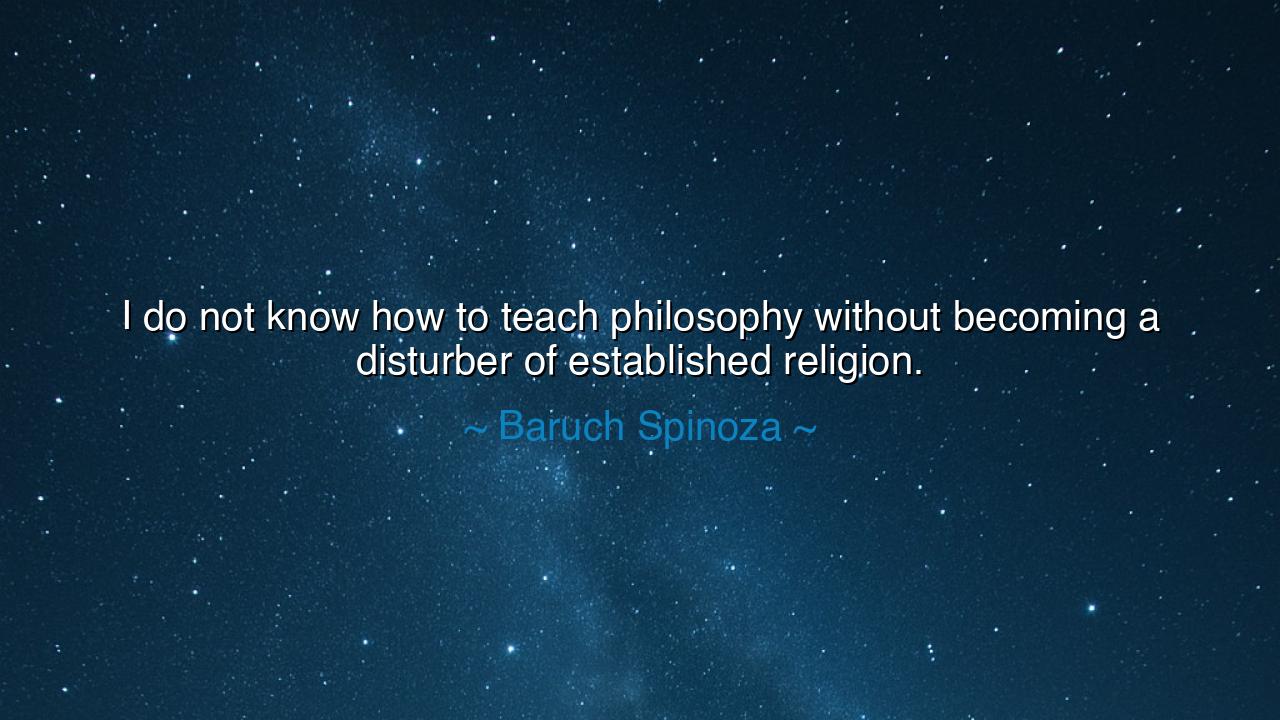
I do not know how to teach philosophy without becoming a
I do not know how to teach philosophy without becoming a disturber of established religion.






When Baruch Spinoza declared, “I do not know how to teach philosophy without becoming a disturber of established religion,” he spoke not as a rebel for rebellion’s sake, but as a seeker of truth who understood the peril of his path. In these few words, the exiled philosopher revealed an eternal tension between knowledge and belief, between the freedom of reason and the authority of dogma. His voice, quiet yet unyielding, still resounds across centuries — the voice of one who saw that to think deeply is to challenge the comfortable illusions that bind the minds of men.
Spinoza was born into a devout Jewish community in seventeenth-century Amsterdam, a haven for exiles yet bound by its own sacred laws. From a young age, he questioned the nature of God, scripture, and truth, daring to see divinity not as a ruler beyond the world but as the infinite substance within it — the pulse of existence itself. This vision, later written in his Ethics, shattered the walls of conventional faith. The elders of his synagogue cast him out with a curse so fierce it forbade his name to be spoken. Yet, he did not renounce his love for truth. He continued his search, forging a path between philosophy and spirituality, knowing that every insight he shared would unsettle the guardians of orthodoxy.
To teach philosophy, as Spinoza understood, is to awaken the mind from its slumber — and such awakening is never gentle. Philosophy demands that one ask why, even of sacred things; that one test belief against reason, and truth against fear. The established religions of his day, fortified by tradition and authority, saw such questioning as heresy. Yet Spinoza’s aim was not to destroy faith, but to purify it — to lift it from superstition to understanding. His God was not confined to temples or scriptures, but dwelled in the unfolding order of the universe. In seeing the divine in all things, he both transcended and threatened the religions of men.
History is filled with others who bore the same burden. Galileo Galilei, when he turned his telescope toward the heavens, saw not angels but planets in motion. The Church silenced him, for his discoveries disturbed the celestial order decreed by theology. Yet truth could not be caged; his observations endured, his courage ignited the dawn of modern science. Like Spinoza, Galileo stood at the crossroads of faith and reason, proving that those who love truth must sometimes walk the road of exile and solitude. For to reveal what is real is to unsettle what is revered.
In his words, Spinoza offers not just a confession, but a warning to every age: that when thought grows timid, when philosophy ceases to question, the spirit of man begins to decay. The “disturber” is not an enemy of faith, but its savior — for without disturbance, there can be no growth. True religion, if it is to endure, must withstand the fire of reason and emerge purified. The philosopher’s task, therefore, is sacred: to strip illusion from truth, even at the cost of peace.
The lesson is this: to think freely is to live courageously. One must not fear the tremor that comes when cherished beliefs are questioned, for it is through such tremors that understanding deepens. Do not worship certainty; it is a fragile idol. Instead, cultivate the humility to see that truth is vast, ever-unfolding, and indifferent to our comfort. As Spinoza himself wrote, “The more we understand, the more we love.”
And so, let each who hears these words remember: the path of the thinker is not a quiet one. To seek truth is to disturb — but also to enlighten. Let your mind be fearless and your heart steadfast. Question not to destroy, but to illuminate. For the world has enough followers; it needs more seekers, more disturbers, who will speak what is true though temples tremble and thrones grow uneasy. In this, you will honor Spinoza’s spirit — and perhaps, find your own divine clarity amid the storm.






AAdministratorAdministrator
Welcome, honored guests. Please leave a comment, we will respond soon